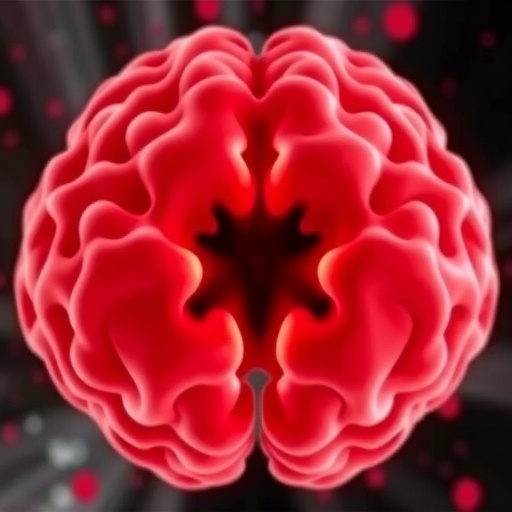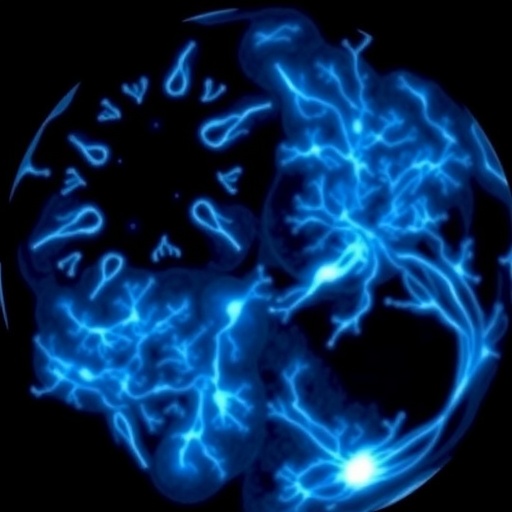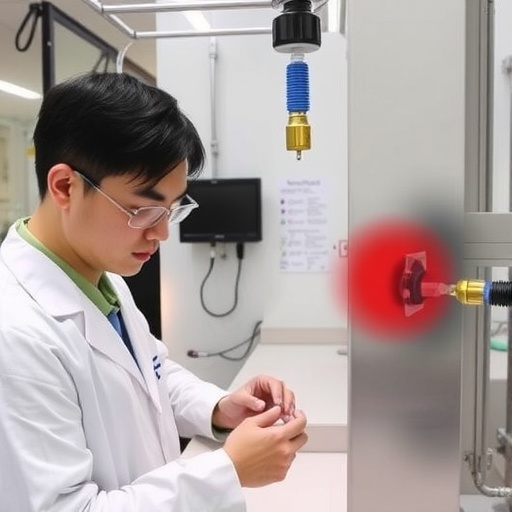PROTECT YOUR DNA WITH QUANTUM TECHNOLOGY
Orgo-Life the new way to the future Advertising by AdpathwayIn a groundbreaking study set to shape the future of glioblastoma treatment, researchers have uncovered the underlying mechanisms by which glioblastoma tumors develop resistance to an innovative class of therapies known as antibody-drug conjugates (ADCs). These therapies, designed to target and destroy cancer cells with high specificity, are often rendered ineffective by the cancer cells’ ability to adapt and overcome targeted treatments. The study, authored by Blomquist, Noviello, and Sereduk, delves into the intricacies of transcriptional reprogramming in glioblastoma and the resultant suppression of the epidermal growth factor receptor (EGFR) by TEK, a receptor tyrosine kinase.
The implications of this research are profound, particularly in the context of glioblastoma, which is notoriously aggressive and resistant to conventional therapies. Glioblastoma multiforme, the most common and deadly primary brain tumor, has long presented a challenge for oncologists, primarily due to its heterogeneous nature and the rapid development of treatment resistance. The findings disclosed in the study indicate a significant shift in our understanding of how these cancers evade therapeutic interventions.
Specifically, the researchers have shown that transcriptional reprogramming plays a pivotal role in mediating resistance to EGFR-targeting ADCs. By altering the expression of specific genes, glioblastoma cells can not only survive these treatments but thrive in their presence. This reprogramming often leads to the activation of alternative signaling pathways that bypass EGFR, thus reducing the efficacy of therapies aimed at this receptor.
One surprising aspect of the study is the role of the TEK kinase in this process. TEK, also known as angiopoietin receptor-2, has been identified as a key player in promoting the suppression of EGFR in glioblastoma cells. The researchers found that when TEK is activated, it initiates a cascade of events that ultimately downregulates EGFR expression. This finding suggests that TEK may serve as both a marker of resistance and a potential therapeutic target in glioblastoma treatment.
The research team employed cutting-edge genomic and proteomic techniques to dissect the molecular changes occurring within glioblastoma tumors treated with EGFR ADCs. By analyzing the tumor microenvironment, the authors were able to identify specific transcription factors that are upregulated in response to treatment, contributing to the reprogramming phenomenon. Their findings provide crucial insights that could guide the development of combination therapies designed to circumvent resistance mechanisms.
In the broader context of glioblastoma research, these results underscore the necessity of personalized treatment approaches. Although ADCs have the potential to significantly improve patient outcomes, the emergence of resistant tumor cell populations highlights the importance of understanding the biology of these tumors at a molecular level. By integrating genomic profiling and functional assays, oncologists may be better equipped to tailor therapies to individual patients’ tumor genetic make-ups.
Furthermore, the study posits that combining EGFR-targeting ADCs with inhibitors of TEK could enhance treatment efficacy. This dual-targeting approach may mitigate the adaptive responses seen in glioblastoma and improve survival rates among patients. As research advances, it is crucial to explore these combinations in clinical trials to determine their effectiveness in overcoming treatment resistance.
The timeline for translating these findings into clinical practice is uncertain but promising. As the scientific community continues to refine its understanding of glioblastoma biology, the hope is that new treatment paradigms will emerge. Integrating novel therapeutic strategies with existing ADCs may unlock new avenues for long-sought improvements in patient outcomes.
The study highlights not only a scientific breakthrough but also a call to action for researchers and clinicians alike. Understanding the molecular underpinnings of glioblastoma resistance will be essential for developing future treatment strategies. The complex interplay between various signaling pathways that govern tumor behavior necessitates a multidisciplinary approach in cancer research, incorporating insights from genomics, pharmacology, and immunology.
Moreover, as scientists delve deeper into the realms of cancer biology, they must remain vigilant about the ever-evolving nature of tumor cells. Glioblastomas are notorious for their rapid evolution and ability to adapt, behaviors that underscore the necessity for continuous monitoring of tumor response during therapy. Real-time assessments of tumor dynamics may become pivotal in guiding treatment decisions and improving patient management.
As the implications of this study are realized, we might also see a shift toward including novel biomarker assessments in routine clinical practice. Such tools could help oncologists predict treatment response and tailor therapies more effectively, ultimately leading to a more refined approach to glioblastoma management.
In conclusion, the discovery of transcriptional reprogramming and TEK-induced EGFR suppression in glioblastoma offers a promising new perspective on treatment resistance. The challenge lies in translating these molecular insights into effective clinical strategies that can improve patient outcomes. As researchers continue to unravel the complexities of glioblastoma biology, it is through these collaborative efforts that we may achieve significant advancements in the fight against this devastating disease.
Subject of Research: Glioblastoma resistance mechanisms to EGFR antibody-drug conjugates.
Article Title: Glioblastoma resistance to EGFR antibody-drug conjugate is driven by transcriptional reprogramming and TEK-induced EGFR suppression.
Article References:
Blomquist, M.R., Noviello, T.M.R., Sereduk, C. et al. Glioblastoma resistance to EGFR antibody-drug conjugate is driven by transcriptional reprogramming and TEK-induced EGFR suppression. J Transl Med 23, 1153 (2025). https://doi.org/10.1186/s12967-025-07216-5
Image Credits: AI Generated
DOI:
Keywords: Glioblastoma, EGFR antibody-drug conjugate, transcriptional reprogramming, TEK kinase, cancer resistance
Tags: antibody-drug conjugates effectivenesscancer cell adaptation mechanismsEGFR antibody resistance in glioblastomagene expression alterations in tumorsglioblastoma multiforme challengesglioblastoma treatment advancementsinnovative therapies for brain cancermechanisms of cancer treatment evasiononcological research breakthroughsreceptor tyrosine kinase TEK roletargeted therapy resistance in glioblastomatranscriptional reprogramming in cancer


 10 hours ago
5
10 hours ago
5





















 English (US) ·
English (US) ·  French (CA) ·
French (CA) ·